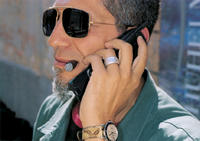
I don't like all his work--I'm less keen, for instance, on his super-saturated images in Common Sense or Think of England--but he has an extraordinary eye, a wry perspective that's never as simple as it seems, and an inventiveness and creativity that gives his work great diversity, while all the time he maintains his customary obsessions.
Who would have thought, for instance, that he'd come up with a project such as Saddam Hussein Watches? And yet, once you have seen it, it's so obvious, so... Martin Parr. It is, moreover, a typically oblique take on politics. Parr is among the most political of photographers, but at the same time one of the most disturbingly apolitical.
Perhaps what's disturbing about Parr's work is how often it literalizes the notion that, ultimately, photography is no more than collectionism.
Parr himself is a notorious collector. I remember seeing a documentary about him in which he showed an interviewer around his house, absolutely stuffed with an almost unimaginably vast assortment of old comics, cheesy plastic ornaments, postcards, and so on. Several of these collections have been repackaged as books, most notably the "Boring Postcards" series. Parr also collects concepts and ideas, with the same almost anti-intellectual, anti-theoretical, non-judgmental passion that characterizes all true collectors: one of his projects, for example, has been to photograph the last parking spaces in car parks around the world.
 So (and despite what I said above) Parr endlessly implies that his photography follows no other logic than his own compulsion to take a picture of yet another person on a mobile phone, say. That the photographer is only some kind of semi-autistic über-geek trainspotter, whose snapshots can have no claims to artistry, subjectivity, or intention, beyond the purely mechanical, machinic.
So (and despite what I said above) Parr endlessly implies that his photography follows no other logic than his own compulsion to take a picture of yet another person on a mobile phone, say. That the photographer is only some kind of semi-autistic über-geek trainspotter, whose snapshots can have no claims to artistry, subjectivity, or intention, beyond the purely mechanical, machinic.At times, in short, it is as though the photographer were no more than the camera's prosthesis.
No comments:
Post a Comment